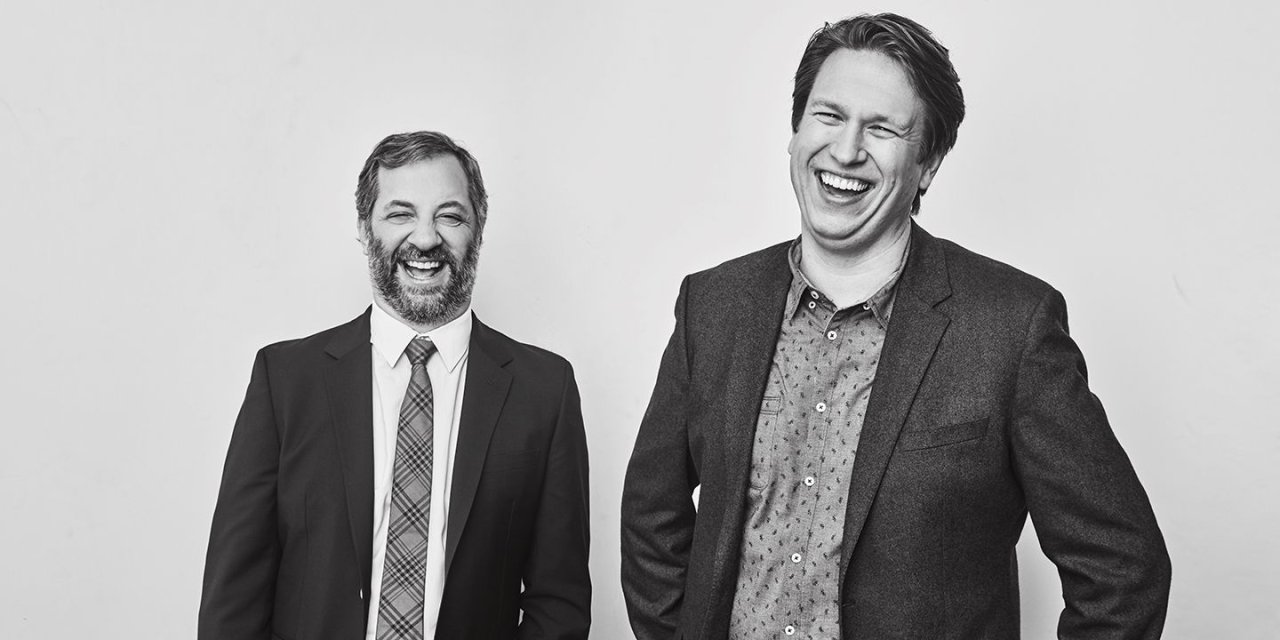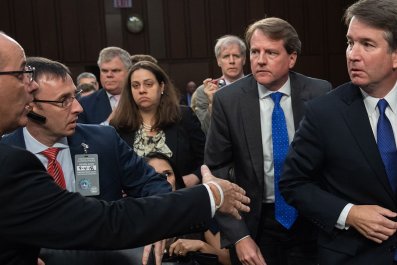In 2015, Jerry Seinfeld said political correctness was ruining comedy. "To me, it's anti-comedy," he told ESPN radio host Colin Cowherd. And Seinfeld is not alone: The sentiment has been echoed by top comics—male (Chris Rock, Gilbert Gottfried, John Cleese) and female (Lisa Lampanelli).
Judd Apatow does not agree. "I find that to be one of the fun challenges of working right now," says the director of the feature comedies Knocked Up and The 40-Year-Old Virgin. "I don't look at it like, 'Oh no, they are shutting us down.' I see it as a call to be smart, clever and sensitive—to see if you can do your thing really well in an evolving environment."
Case in point: Season 3, Episode 4 of Crashing, airing February 10 on HBO. The show, which Apatow executive produces, is a semi-autobiographical account of squeaky-clean comedian Pete Holmes's foray into the pull-no-punches New York stand-up scene. Episode 4, titled "MC, Middle, Headliner," features Holmes performing at a corporate comedy club in New Jersey with his ex-girlfriend Ali (played by Jamie Lee), who MCs, and an older comic, Jason (Dov Davidoff), who headlines.
Jason has no interest in so-called political correctness. He begins his act with a Joe Rogan–esque "What's up, fuckers?!", jokes about buying cheap birth control in Mexico ("Are you sure that's a good idea? There's a lot of Mexicans") and vents about consent culture ("Am I supposed to write out a form that says, 'Do you mind if we do a little fucking?'").
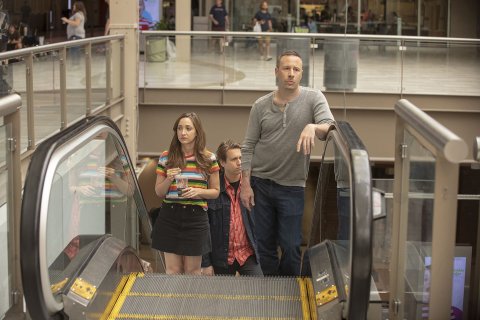
"Some people who watch this won't get why Jason's set was offensive—and that's what I want," says Holmes, who grew up with comedy that "was almost exclusively delivered by Jasons," he says. "The Mexican birth control joke is something I wrote 15 years ago, but I had the sense to never try it."
Audience members in the episode are offended, however, and after they leave scathing Yelp reviews the club owner demotes Jason and docks his pay. Ali—who has been fielding snide, sexist comments from Jason throughout the weekend—suggests that she headline; the owner promotes Holmes instead, citing typical male objections: Ali isn't smiley or enthusiastic enough. In retaliation, she sabotages Jason with new material before she introduces him: "I don't get these idiots who don't get the concept of consent. 'I have to ask if she wants a dick in her?'"
The audience loves it, and Jason bombs. Later, Ali confronts him in the parking lot, a scene Lee, who is also a writer on the show, pushed for. "It felt necessary and satisfying," she tells Newsweek. "I've performed with people like Jason and sat back and thought, Wow, that's a bummer. If I spent as much time with them as Ali spends with Jason in this episode, I would speak up."
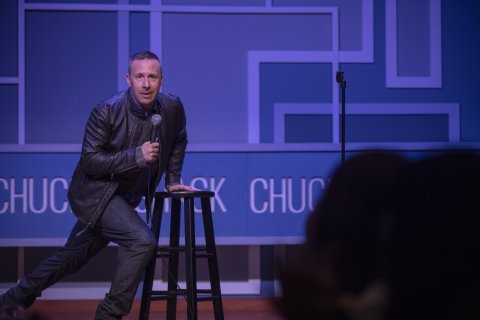
It's one of several small moments in the episode, and the season, when Crashing makes reference to the #MeToo movement's impact on comedy. In the Season 3 premiere, Jason, the manager of a small New York comedy club, mentions overflow business is booming because "the Comedy Cellar is around the corner, and everyone is showing up to see if one of the disgraced comedians is going to make an appearance."
In real life, of course, both Louis C.K. and Aziz Ansari have returned to the Comedy Cellar after allegations of sexual misconduct. Jason's various moments of crossing the line—most notably when he aggressively hits on a waitress—and the repercussions he faces seem mild in comparison.
As Hollywood Reporter critic Daniel Fienberg noted in a 2017 review, Crashing is a series that favors a rose-colored view of the comedy business; it's not intended to be topical or hard-hitting. Holmes, for example, says they shot the waitress scene multiple ways—as much darker and lighter in tone—and ended up going with something in between. Still, it would be impossible for a show known for hiring famous comics to play themselves (like this season's Ray Romano and John Mulaney) to avoid the real-world consequences of #MeToo. (T.J. Miller, for example, guest-starred as himself in Season 1 and faced accusations of sexual assault soon after.)
"Obviously, there are a lot of stories to be told about sex crimes and hardcore harassment, but it's the more casual, everyday harassment that wears people down," says Apatow. "With the waitress, it's not just this guy hitting on her. It's that every guy is hitting on her. There's an ongoing level of disrespect that used to be tolerated and is beginning to change."
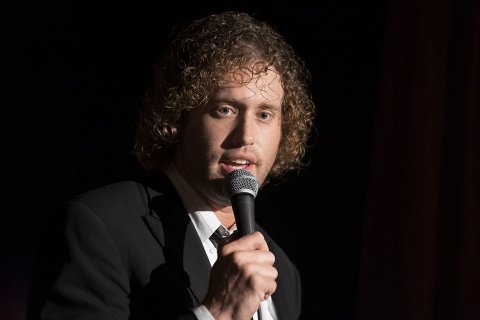
Apatow is in a curious position. He has worked with or is friends with comics on both sides of the issue—"people who are accused of things and people who are accusing people of things. My hope," he says, "is that anybody who hurt anybody finds a way to make it right, and that people who deserve to be heard can get some justice."
Would he hire a disgraced comic for Crashing? Apatow says he doesn't have an answer for that. "It's complicated, because no one is in charge of anything. There's no one to say, 'You're allowed to work. You're not allowed to work. Now you're forgiven. Now you spoke clearly.' I don't think we're in a different place than any other network head or producer. Every show on the air is deciding who to hire."
In the case of Louis C.K., however, he's not feeling particularly charitable: In December, audio leaked of a set performed at a Long Island club, with C.K. mocking both gender-nonbinary people and the student activists who survived the school shooting in Parkland, Florida.
"He's somebody that everybody loves," says Apatow, "and all they want is for him to say, before he starts his set, 'I hurt a bunch of people. I want to make it right. I'm trying to figure out the best ways to do that, and now I'd like to try to make you laugh. Is that OK?'"
Because Louis C.K. is not managing the situation, Apatow adds, "every comedian in the world has to discuss this. In a way, he's foisted this upon everyone else—every club owner, every performer. That hasn't been a positive thing for comedy."
"The world is changing quickly," he goes on, "and it's making men uncomfortable. There's comedy in exploring discomfort, and there's a way to do that with a good heart. There's another way to do it where you're resisting, you don't get it and you're mean. That needs to go away."
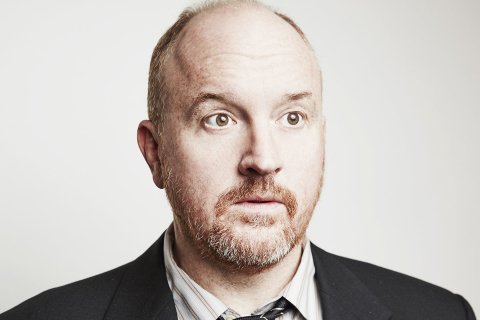
Like C.K., it doesn't seem that Crashing's Jason has learned anything by the episode's end. "I love characters growing—if anything, it's one of my weaknesses as a writer," says Apatow. "But for this episode, we felt like the point was that [Jason] takes a beating. If he gets it, it's buried very deep. We don't know if he's ever going to make an adjustment."
Apatow has had to make his own adaptations. He's been criticized for perpetuating comedy's bro culture; Katherine Heigl famously called 2007's Knocked Up "a little sexist" for portraying her character as a killjoy—a quote that haunted her for the next decade. And he admits that he didn't think a lot about the issue of sexual harassment, or male-female power struggles, until he began executive producing Girls in 2012. "Lena [Dunham] and Jenni [Konner] wrote about those things long before the #MeToo movement hit," he says.
Episode 4 of Crashing was written by three men—Dave King, Mike Lawrence and Holmes—and directed by another man, Oren Brimer. Though Jamie Lee was in the writers' room, Apatow says he didn't really think about gender when it came to who wrote the episode. Some might argue that's part of the overall problem.
But Apatow's desire to evolve seems genuine, and the dilemma now facing male creators is something he isn't alone in grappling with. "I don't know that I've always been as sensitive to people's feelings when I write," he says, "but that's tricky when you have characters that are insensitive. Can you never have a character who's awful, who makes sexist or racist jokes? We need people to reflect real life."
When writing humor, he asks himself, "Is your heart in the right place? Does your audience get what you're trying to express? I think we are all debating what those lines are right now."



